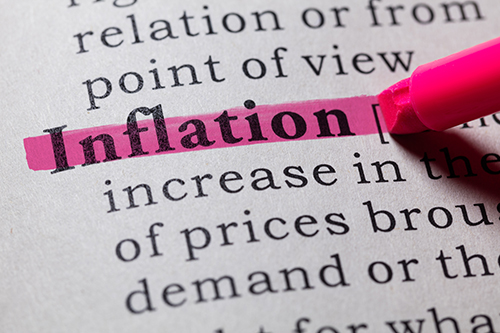Inflation is an economic concept that is often discussed, yet frequently misunderstood. It is the sustained increase in the general price level of goods and services in an economy over a period of time. Inflation can have a significant impact on your financial goals, as it reduces the purchasing power of your money. It is important to understand inflation and how it affects your financial goals.
Inflation basics
Inflation is the price increase of goods and services: more money is needed to buy the same goods (like a cheeseburger or a car) and services (like a haircut). Over time, the same amount of money—say $10—buys less and less. You’ve already experienced this in your lifetime—instead of paying $15 for a book like you did last year (or even a few months) ago, it costs $15.50 now. That’s inflation at work. Inflation affects the prices of pretty much everything in your budget.
There are four types of inflation that are named and categorized by their speed: creeping, walking, galloping, and hyperinflation. Beyond that, there are specific types of asset inflation and wage inflation, but we’ll stick to looking at the first four general types.
Creeping inflation is prices rising three percent or less a year. This mild inflation boosts demand and results in economic expansion as consumers expect a steady increase in costs and buy more now to avoid paying more later. Walking inflation is prices rising between three and ten percent in a year. This can be bad for the economy as consumers enter a buying frenzy where supply and wages can’t keep up. Common goods and services can become priced out of reach for most people. Galloping inflation is prices rising more than 10 percent. Money loses value so fast that the economy destabilizes. Finally, hyperinflation is prices rising 50 percent or more a month. This is rare and usually the result of government turmoil, war, etc.
The annual inflation rate for the United States was 4.0% for the 12 months ended May, according to U.S. Labor Department data published on June 13, 2023.
How/why inflation happens
The Federal Reserve System (or just “the Fed”) is America’s central banking system. As dictated by Congress, the Fed has three main tasks: stabilize prices for Americans, create conditions that maximize employment rates, and moderate long-term interest rates. While the Fed has several tools and mechanisms to achieve these objectives, the one you probably hear about most is the fed funds rate.
The Fed requires that financial institutions hold a certain amount of capital in reserve at the end of every day, determined as a percentage of the total loans the bank or credit union has made. This reserve requirement prevents banks and credit unions from lending out every single dollar and not having enough cash on hand to start the next day.
At the end of every day, some financial institutions don’t have enough in reserve to meet the requirement, while others have much more than they need. To solve this problem, those with more than enough money in reserve will lend their extra Federal Reserve funds overnight to those that need it. The fed funds rate is the interest rate the banks and credit unions charge each other for this type of loan.
Raising the fed fund rate means the price of other goods like food and gasoline will stay low, and each paycheck should stretch further as inflation is slowed. Rising rates will also benefit those who have money in high-yield savings accounts.
When the Fed lowers the rate, the opposite occurs: banking institutions are more likely to borrow from one another, businesses expand, salaries increase, credit card rates drop, larger mortgages are lent out, and consumers spend more. The economy is stimulated and allowed to grow until the balance is tipped once more with overspending and inflation, which will prompt the Fed to once again raise rates.
What inflation means for retirees
As you can see, inflation is expected, and all retirement plans should take it into account to help you set and reach an appropriate goal. However, other events and policies can affect inflation rates outside of the fed fund rate, which can’t always be planned for. When prices for common goods and services that retirees depend on—food, medications, transportation—jump too high too fast, Social Security benefits might fall short. This is another reason why Americans should have a retirement plan in addition to their Social Security benefit.
Stay informed and proactive, and you can prepare for a more secure financial future.


